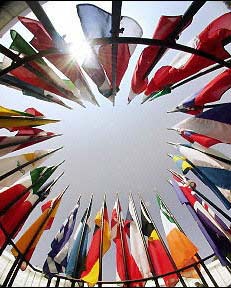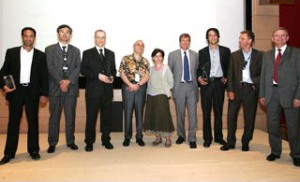 The French Environmental Agency published an interesting study on “Functional Economy” (also called “Service Economy”) which means replacing “purchasing products” by “renting products”. According to this study, a “Functional Economy” would lead to reduction in raw materials and energy consumption and therefore major environmental benefits.
The French Environmental Agency published an interesting study on “Functional Economy” (also called “Service Economy”) which means replacing “purchasing products” by “renting products”. According to this study, a “Functional Economy” would lead to reduction in raw materials and energy consumption and therefore major environmental benefits.
 The Sustainable Packaging Coallition announced the availability of a new tool, “Compass” allowing companies to benchmark the environmental impact of packaging.
The Sustainable Packaging Coallition announced the availability of a new tool, “Compass” allowing companies to benchmark the environmental impact of packaging.
“Sustainable Packaging is :A. Is beneficial, safe & healthy for individuals and communities throughout its life cycle;B. Meets market criteria for performance and cost;C. Is sourced, manufactured, transported, and recycled using renewable energy;D. Maximizes the use of renewable or recycled source materials;E. Is manufactured using clean production technologies and best practices;F. Is made from materials healthy in all probable end-of-life scenarios;G. Is physically designed to optimize materials and energy;H. Is effectively recovered and utilized in biological and/or industrial cradle to cradle cycles”
In that context, Boris Johnson, the new mayor of London, has then decided to go for green procurement when reintroducing the Routemasters. The 2 winning projects from Aston Martin and Capoco present vehicles that are said to be low polluters and low CO2 emitters. Solar panels are even integrated in the glass roof for the Aston Martin version, although the efficiency of solar panels in the English capital, known for its fog, still remained to be tested. More details in the following video from the BBC (click_here).
 It is well known that the London Organizing Committee has made Sustainability a core policy of the 2012 Olympic Games, since an ambitious 2012 Sustainability Plan was published in November 2007. What is new, is the profound impact this initiative will have on the Sustainable Procurement initiative of 1000’s of companies.
It is well known that the London Organizing Committee has made Sustainability a core policy of the 2012 Olympic Games, since an ambitious 2012 Sustainability Plan was published in November 2007. What is new, is the profound impact this initiative will have on the Sustainable Procurement initiative of 1000’s of companies.
The Organizing Committee has just issued today a very ambitious “Olympics Sourcing Code” ‘(access here) which will apply to all products and service providers.
Two things are really innovative about this code:
- First the code includes a very detailed list of restricted substances, going beyond regulations (and including for example the (in)famous phtalates and bisphenol)
- The second and most important thing for us, is that the Code is not only focused on suppliers environmental/socials practices but also on their responsible sourcing practices. All suppliers have to ensure:
This initiative should therefore have a massive impact, on the 5000 direct suppliers, but also cascading to more than 25000 tier-2 suppliers.
 This week Siemens announced that they were appointing Barbara Kux as both Chief Procurement Officer and Chief Sustainability Officer. This is not only a great news for gender equality (Mrs Kux will be the first woman on Siemens Board in 160 years, and the 1st woman on a DAX 30 board), but a real proof of the strategic alignment between Purchasing and Sustainability.
This week Siemens announced that they were appointing Barbara Kux as both Chief Procurement Officer and Chief Sustainability Officer. This is not only a great news for gender equality (Mrs Kux will be the first woman on Siemens Board in 160 years, and the 1st woman on a DAX 30 board), but a real proof of the strategic alignment between Purchasing and Sustainability.
More and more companies realize that the future of Sustainabilty lies in Supply Chains Management (last year the Sustainability Director of Schneider, Gilles Vermot-Desroches, even explained in a conference, that he anticipated that in a couple of years, both functions would be merged, as companies would change their focus from internal to exernal value chains).
Mrs Kux appointment is a perfect example of this. She was holding exactly the same 2 jobs at Phillips, which during her tenure, became both a leader in Sustainable Procurement, and grew its “green business” into a 5.3bn€ activity. I had the chance to attend her presentation at the latest Insead Leadership Summit last summer : you can find the video and summary here.
We wish Barbara Kux the same success at Siemens!
 In the latest HEC Benchmark we conducted, “Sustainable Procurement” was the #2 priority of Procurement Executives…just behing “Cost Reduction”. At the time where a lot of purchasing organisations are under pressure to deliver additional cost savings to their organisation, there is a risk that some will postpone or push back on their Sustainability Programs.
In the latest HEC Benchmark we conducted, “Sustainable Procurement” was the #2 priority of Procurement Executives…just behing “Cost Reduction”. At the time where a lot of purchasing organisations are under pressure to deliver additional cost savings to their organisation, there is a risk that some will postpone or push back on their Sustainability Programs.
The latest Renault commercial reminds us that “Green” and “Low Cost” are not contradictory..quite the opposite. “Lower in CO2…Lower in €” and a nice visual reminds us that Cars Leasing and Fleet Management is one of the spend categories where Travel Managers have been able to leverage the environmental factor to reduce costs. In France companies are now taxed on the CO2 emissions of company cars, providing an additional incentive to provide lower costs / lower horsepower vehicles to their executives. But in several countries procurement executives are telling us that the “guilt” associated to high emission cars is helping them to drive compliance to their lower cost Travel policies.
By the way, Renault is also one of the automakers in Europe who has one of the most ambitious Sustainable Procurement program, and we have learnt that despite the economic slow down, and procuctions cuts they were facing, they had no intention to stop or delay this program. A good example for many companies.
We are glad to have been selected to joint this program, which will allow us to re-inforce our partnership with Microsoft on the technology aspect, as well as to develop or relationships with the Paris City administration, which we know is very committed to “Green Procurement”.
Three groundbreaking studies by organizations such as the UN Global Compact, Mc Kinsey and Goldman Sachs presented today at the Global Compact Leaders Summit show that an increasing number of business leaders see corporate responsibility as a way to compete successfully and to build trust with stakeholders – and that sustainability front-runners in a range of industries can generate higher stock prices. At the same time, there are important “performance gaps” in implementation, as highlighted by a complementary survey of chief executives participating in the Global Compact: 59 per cent of CEOs said corporate responsibility should be embedded into global supply chains, but only 27 per cent think they are doing so. You can acess the report here.
EcoVadis has been selected in the “Internet & Services” category. Co-Organised by the French Senat and Essec Business School, Tremplin Entreprise is the leading event allowing selected French companies to meet the international venture capital industry. Since 1999, Tremplin Entreprise, is part of Paris Investors Week organised by AFIC, Paris Europlace & CDC Entreprise. EcoVadis has been selected in the “Internet & Services” category. Co-Organised by the French Senat and Essec Business School, Tremplin Entreprise is the leading event allowing selected French companies to meet the international venture capital industry. Since 1999, Tremplin Entreprise, is part of Paris Investors Week organised by AFIC, Paris Europlace & CDC Entreprise.




